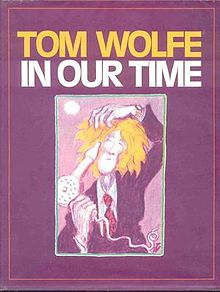New York: Farrar, Straus and Giroux, 1980.
Summary from Publisher:
Rumbling through In Our Time like an indoor temblor is the shifting moral terrain of America. Tom Wolfe introduces us to the inhabitants of this cockeyed landscape-The New Cookie, “the girl in her twenties for whom the American male now customarily shucks his wife of two to four decades, when the electrolysis gullies appear above her upper lip” . . . The Modern Mother, who is more childish than her children: “Puh-leeze, Mummy, nobody wants to hear about coke, Acapulco, or Fleetwood Mac”. . . The Fondly Trusting Father as he first opens the door to his daughter’s coed dorm room: “Two pairs of eyes pop up in the bed, blazing like raccoons at night, illuminating the shanks, flanks, glistening haunches, and cloven declivities of a boy and girl joined mons-to-mons” . . . The jaded Teenager, burnt out by eighteen: “I got this supervisor where I work–these middle-age people, man, all they think about is sex and dope. He’s always coming around with this little grin on his face, talking about amyl nitrite and PBD. I mean, that’s what you do in the ninth or tenth grade, man”. . . The Jogger, who is driven on, mile after mile, mainly by his feeling of superiority over his fellow citizens: “With their chuck-roast lives and their necrotic cardiovascular systems and rusting hips and slipped discs and desiccated lungs” . . . Not to mention The Senator, who cashes in on his role as protector of the moral purity of the Republic by doing television commercials: “There are lots of places where folks don’t know me at all . . . I recently got me an American Express card. With this, maybe they’ll treat me like somebody important, though I’m jes’ a plain ol’ country lawyer from North Carolina. The American Express card. Don’t leave home without it.”
Tom Wolfe’s drawings in In Our Time recall the palmy days when social caricature flourished in the great European satirical magazines Simplicissimusand L’Assiette au Beurre. His eye for the costumery and gesture of the moment is often as telling as his Pantagruelian appetite for the zaniness of the second half of the twentieth century, which he regards as America’s “Elizabethan period, her Bourbon Louis romp, her season of rude animal health and rising sap!”
Online:
TomWolfe.com (excerpt)
Amazon

